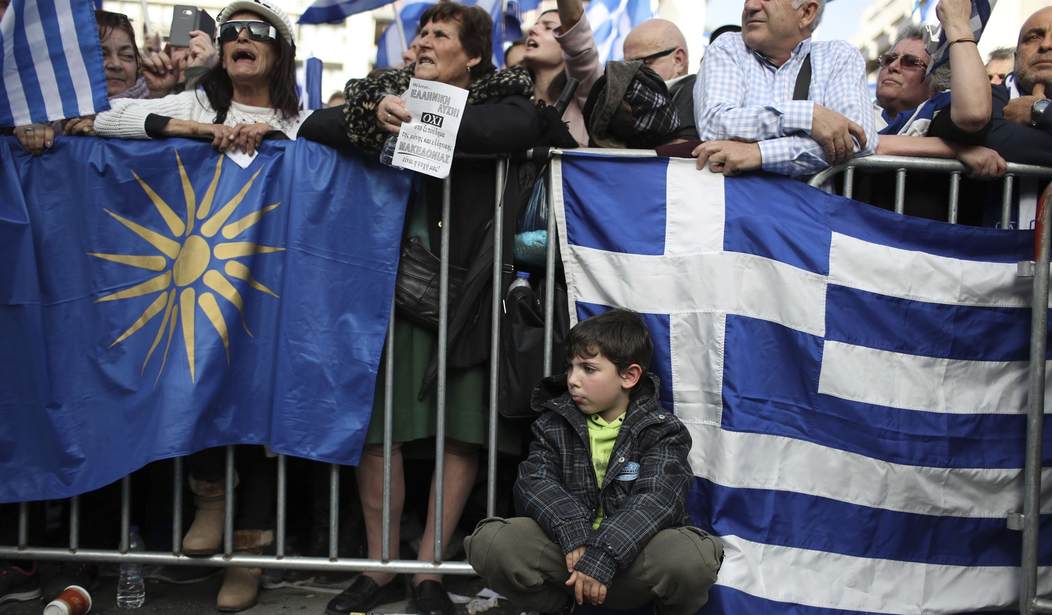A new round of diplomatic negotiations promoted by the UN, the EU and NATO may finally end The Name War -- the odd but bitter little conflict pitting Greece against its northern neighbor, Macedonia.
Understand that calling Macedonia "Macedonia" riles many Greeks -- over 60 percent according to a poll touted by Greek nationalists. Riled Greeks prefer to refer to Macedonia as the FYROM, the Former Yugoslav Republic of Macedonia. Macedonia is its "communist era" name.
Whether Macedonia or FYROM, the country became independent in 1991, when Yugoslavia dissolved amid civil war.
The Name War also began in 1991. In 1993, Greek political opposition to Macedonia's name forced Macedonia to join the UN under the "provisional" name FYROM.
In the subsequent years of rhetorical sniping, The Name War has taken no lives. Wry commentators familiar with the Balkan history regard that as good news.
The dispute's possible resolution is through constructive diplomacy is even better news.
Admittedly, it isn't really a war. However, at its core, the Greece-Macedonia dispute involves "territory and tribe" -- historic land disputes and ethnic identification. In conflicts around the planet both elements often distort issues and lead to bloodshed.
The political map, World War One and Alexander the Great of Macedon begin to explain The Name War.
Macedonia is located in what was southern Yugoslavia, east of Albania, west of Bulgaria, south of Kosovo and Serbia, and due north of Greece. Ethnically, FYROM-Macedonia is Slav and Albanian.
Recommended
Greek Macedonia divides into three administrative regions: West Macedonia, Central Macedonia and East Macedonia and Thrace. The port city of Thessalonica (Greece's second largest city) is located in Central Macedonia.
When "the northern political entity" retained the name Macedonia, Greeks interpreted that as a Slav-Albanian threat and asserted the use of the name indicated a Macedon claim to Greek Macedonia and its Aegean ports.
In the First Balkan War (1912-1913), Greece took Greek Macedonia and the port of Thessalonica from Ottoman Turkey -- much to the chagrin of Slavic Balkan nations, Bulgaria in particular. Greek extremists regard Macedonian Slavs as Bulgarians. The First Balkan War set the stage for World War One.
Follow the meandering chain of history and hate and a substantial number of Greeks in 1991 were prepared to believe Macedonia coveted its territories.
Now for Alexander. Alexander was the greatest Macedonian. Macedonia named its major international airport for Alexander, which inflamed Greeks.
Alexander was a Hellene -- an advocate of a Greek culture. Ethnic Greeks of his time regarded Macedonians with suspicion. Disputes from 335 BC shouldn't affect 21st century politics, but...sometimes they do.
The Name War became a NATO problem. In 2008 NATO member Greece blocked Macedonia's bid to join the alliance.
Time and Greece's dire economic straits have tempered Greece's attitudes toward its northern neighbor. The fact that most members of the UN now casually refer to the Republic of Macedonia, not the FYROM, is another influence.
In August 2017, both countries acknowledged they were pursuing a solution to the dispute. In January 2018, Macedonia said it would rename the Alexander the Great Airport. Nice move. The Great's been dead a long time.
Greek government officials indicate they would accept a name with a modifier like North or Upper Macedonia.
Macedonia's foreign minister says his country wants a "dignified" solution. Macedonia definitely wants to join NATO. The country is positioned to join the European Union. Greek support would facilitate it.
Experienced diplomats call this "an opportunity." And it is.

























Join the conversation as a VIP Member